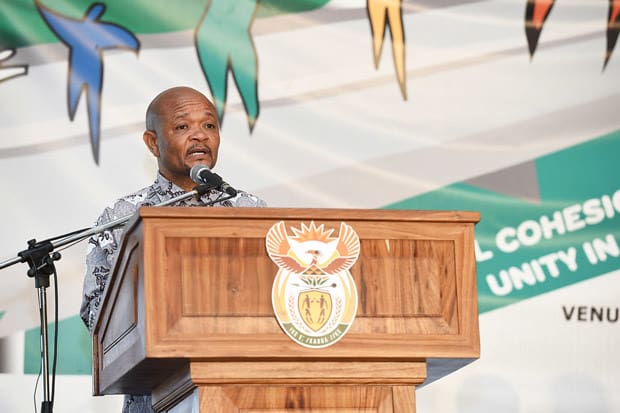President Cyril Ramaphosa has set up a judicial commission to investigate serious claims against Police Minister Senzo Mchunu.
This follows allegations by KZN Police Commissioner Nhlanhla Mkhwanazi that Mchunu interfered in investigations and is linked to criminal activity.
Ramaphosa placed Mchunu on leave and appointed Professor Firoz Cachalia as acting police minister. The commission will be led by Acting Deputy Chief Justice Mbuyiseli Madlanga.
While some see this as a strong move against corruption, others worry the commission may end up being ineffective like past ones, such as the Zondo Commission.
So, what exactly does a judicial commission of inquiry do? Can it really lead to accountability? To unpack it all, explain spoke to Janine Erasmus, editor at Corruption Watch, a non-profit organisation working to fight against corruption and to ensure that politicians are held accountable for their actions.
1. What is a commission of inquiry, and why does the government often turn to it when corruption is exposed?
A commission of inquiry is essentially a fact-finding or information-gathering body. It is established under Section 84.2(f) of the Constitution, where the power to appoint such a commission is conferred on the President. The Commissions Act of 1947 further regulates the functioning of such commissions.
The commission will ultimately use the information it has gathered to advise and make recommendations to the government’s executive arm in relation to a complex topic – such as the arms deal.
Well-known examples include the Arms Deal Commission, also known as the Seriti Commission, the Marikana Commission, the Mokgoro Commission, and, of course, the Zondo Commission.
A national commission of inquiry can be a powerful tool to uncover truth in the murkiest of waters. It is uniquely placed to investigate matters of public concern, and while the findings are not binding, if taken seriously by the executive, they can lead to criminal investigations, combat impunity, and promote accountability. And if the executive implements recommendations in the sight of the public, this will boost public trust.
This is why the government often turns to commissions of inquiry. They have great potential for bringing about justice and positive change – provided they are used properly and in good faith.
In my view, the fact that they are independent of politics is also an advantage.
2. Can a commission of inquiry lead to arrests or prosecutions, and how do they differ from a criminal investigation?
Commissions of inquiry are not the same as criminal investigations and court sittings, although there are similarities in that they’re often chaired by judges or former judges, involved parties are often represented by lawyers, and witnesses give their evidence under oath.
A court judgment in a criminal case is binding, so the accused cannot simply ignore a judgment or they will be in contempt of court. Their only chance of avoiding a court order is to successfully appeal it or take it on judicial review and ask for it to be set aside – both of which processes entail further court action.
A judicial commission of inquiry, on the other hand, is not a criminal proceeding. It will make non-binding recommendations to the person who set it up – usually the president. It is required to stick to the issues at hand, unless their terms of reference are amended. The terms of reference establish what matters the commission will investigate, who will head it, and what powers it will be granted.
It’s also important to note that a commission’s rules on evidence are not as stringent as those of a court, because it has the discretion to consider all evidence that it deems relevant to its inquiry.
A commission of inquiry certainly can lead to arrests and prosecutions, which are the responsibility of law enforcement.
3. Many South Africans still remember the Zondo Commission. What were its key achievements, and where did it fall short?
The Zondo commission brought state capture firmly into the public consciousness. It laid bare the machinations of the politically-connected and the political elite, and uncovered the extent of the public money that went into the pockets of these people. We are talking billions of rands.
We have to hand it to former Chief Justice Raymond Zondo and his team – it was a very difficult topic to probe within a short time – even the several years of hearings could not have covered it all, and I think there was much left to still investigate.
The cost was a negative factor. It cost nearly a billion rands and the South African public will be forgiven for asking if they have got their money’s worth, since we have seen no successful high-profile prosecutions. The lengthy period it took for the commision to unfold was another factor.However, it was vital to delve thoroughly into the allegations and evidence so that targeted and effective anti-corruption measures could be developed.
Many of the shortcomings in implementing the Zondo commission’s recommendations are not its own fault, but rather the fault of bodies such as Parliament or the National Prosecuting Authority, and the continued political interference which has hampered its work from the start.
4. What lessons should government and civil society take from the Zondo Commission as they approach the Mchunu investigation?
It’s important to act urgently on important information that comes to light, especially if it can lead to arrests and prosecution. That’s why the terms of reference of the Zondo commission were amended to reflect that prosecutors could immediately begin working on evidence brought before the commission, instead of having to wait for the final reports.
In my view, this is an important consideration. Justice delayed is justice denied, and it has been delayed long enough.
Civil society must continue to monitor the commission and its findings and recommendations, and apply pressure when necessary to make the implementation of the latter a reality.
5. Some critics say commissions are used to delay accountability. Is this a fair criticism?
I don’t think so for the most part. In some cases, it is necessary to dig deep into a matter to get all the facts and figures to give law enforcement the greatest chance of success.
The Seriti commission was a rare case where the proceedings were used for the purpose of delaying accountability. Because it found that the arms deal was conducted legitimately from start to finish and there was no corruption at all, implicated persons thought they could use the findings to exonerate themselves and avoid being held to account. This is why Corruption Watch and Right2Know Campaign took the report on judicial review, because it was a travesty of justice. We won that case, and the findings were set aside, which means the accused could not use it to vindicate themselves.
As South Africans wait for yet another commission, the Mchunu inquiry could be a crucial test of whether these commissions can truly serve as instruments of justice.
What’s clear from Erasmus’ insights is that commissions can be powerful tools for truth and accountability, but only if their findings are acted upon with urgency and integrity.
Lona is a recent graduate with an Honours degree in Journalism and Media Studies from Wits University. Passionate about storytelling, she is eager to learn, grow, and hone her writing skills.




